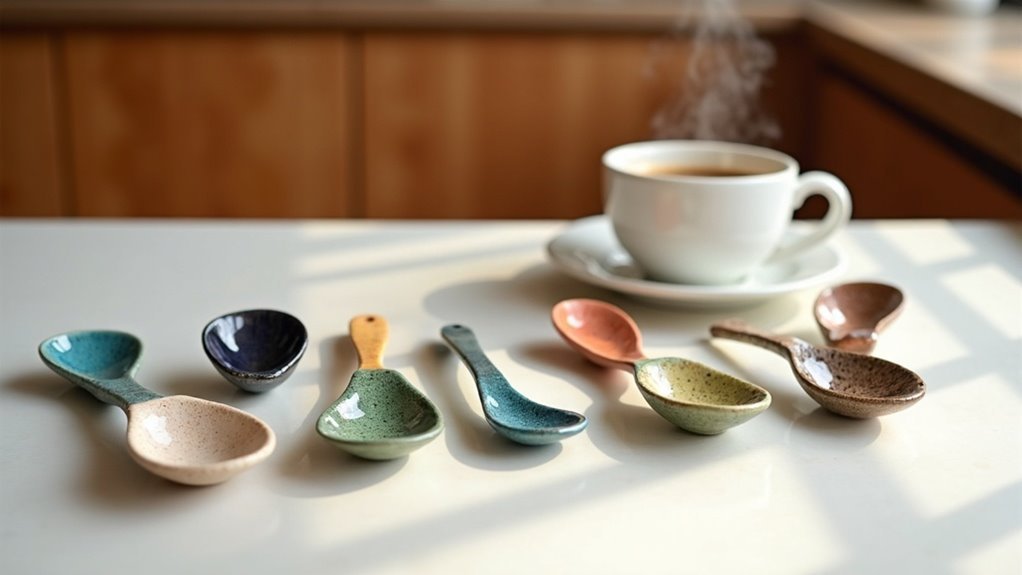Yes, coffee can worsen PMS symptoms. It may heighten irritability, anxiety, and disrupt sleep patterns, contributing to mood swings. High caffeine intake can also intensify cramps and menstrual discomfort, as well as feelings of dizziness and nausea. Reducing coffee consumption could alleviate some of these symptoms, making it easier to manage your PMS. As a coffee enthusiast, exploring different brewing methods or types of coffee with lower caffeine content might provide a better experience during this time. There’s more to explore about how you can enjoy coffee while being mindful of its effects on your body.
Key Takeaways
- Caffeine found in coffee can heighten irritability and anxiety during PMS, negatively impacting mood stability.
- High coffee consumption may lead to longer, heavier menstrual periods and increased cramps.
- Disrupted sleep patterns from caffeine can exacerbate fatigue and mood swings associated with PMS.
- Caffeine may contribute to inflammation and bloating, intensifying menstrual discomfort.
- Reducing caffeine intake from coffee is recommended to alleviate premenstrual symptoms and improve overall well-being.
The Biological Effect of Caffeine
When you enjoy coffee, the caffeine it contains acts as a stimulant by blocking adenosine receptors in your brain, which can enhance your alertness.
However, it may also lead to increased feelings of anxiety and irritability, particularly during PMS. High coffee consumption can disrupt your sleep patterns, resulting in fatigue that exacerbates PMS symptoms like mood swings.
High coffee intake can heighten anxiety and irritability, especially during PMS, and disrupt sleep, worsening mood swings.
Additionally, coffee may contribute to inflammation and bloating, intensifying physical discomfort during menstruation.
Research indicates that excessive coffee intake can amplify emotional symptoms, such as restlessness, and may even lead to longer, heavier menstrual periods, suggesting a potential negative impact on your menstrual health.
Caffeine and PMS
While many coffee enthusiasts relish their daily brew, it’s essential to understand how caffeine can affect PMS symptoms. Studies indicate that caffeine can heighten irritability and anxiety, potentially impacting your overall mood. Additionally, a high caffeine intake may contribute to longer, heavier menstrual periods.
| Caffeine Effects on PMS | Symptoms Impacted |
|---|---|
| Increased Anxiety | Mood Swings |
| Disrupted Sleep Patterns | Fatigue |
| Prolonged Periods | Irritability |
| Hormonal Imbalance | Stress Levels |
If you’re dealing with PMS challenges, you might want to consider moderating your coffee consumption for improved symptom management.
How Caffeine Affects Cramps
Caffeine’s influence on menstrual cramps is an important topic to consider, especially for coffee lovers.
Research indicates that high caffeine and coffee intake can potentially worsen menstrual disturbances, leading to increased intensity of period pain and cramps. Regular consumption of coffee might contribute to inflammation and bloating, which can complicate your experience during your period.
Some studies suggest that women who frequently enjoy coffee report more severe cramps compared to those who limit their caffeine intake.
Therefore, if you’re dealing with pre-menstrual symptoms, it may be wise to monitor your coffee consumption to understand its potential impact on your menstrual discomfort.
Caffeine’s Impact on Dizziness and Nausea
While you might enjoy that cup of coffee for an energy boost, it’s crucial to be aware of how caffeine can affect feelings of dizziness and nausea, particularly during PMS. Excessive caffeine consumption can worsen these symptoms, resulting in discomfort and heightened anxiety. Here’s a quick overview of caffeine’s impact:
| Symptoms | Effect on PMS |
|---|---|
| Dizziness | May worsen fatigue |
| Nausea | Can indicate overdose |
| Increased Heart Rate | Heightens anxiety |
| Blood Pressure | Affects blood flow |
Monitoring your coffee intake is essential for managing symptoms during PMS, which can help alleviate dizziness and nausea effectively.
Managing PMS Symptoms Through Diet
Managing your symptoms during PMS can greatly improve your comfort and well-being. While coffee is a popular choice for many, reducing your intake of caffeinated beverages might help alleviate premenstrual symptoms, as caffeine can intensify anxiety and menstrual pain.
Consider making dietary modifications by incorporating more iron-rich foods, like leafy greens and red meat, to combat fatigue. The American College of Obstetricians and Gynecologists suggests limiting caffeine to enhance symptom relief.
Alternatives to Coffee During PMS
What can you sip on during PMS instead of coffee? Consider these caffeine-free alternatives that can help you feel better:
- Herbal teas like chamomile and peppermint soothe symptoms and provide comfort, making them a wonderful choice for those looking to avoid coffee.
- Matcha green tea offers antioxidants with less caffeine, giving you a gentle mood boost without the jitters associated with traditional coffee.
- Chicory root coffee mimics coffee’s taste and aids digestion, helping to reduce bloating while satisfying your craving for that coffee flavor.
- Ginseng tea enhances energy levels and mood, making it ideal for anyone wanting to cut back on caffeine consumption while still feeling uplifted.
Additionally, electrolyte-rich drinks like coconut water keep you hydrated and help combat fatigue, making them excellent options during your menstrual cycle.
Lifestyle Changes to Alleviate PMS
To alleviate PMS symptoms, consider incorporating coffee into your daily routine along with other dietary adjustments and stress management techniques.
Enjoying a balanced diet complemented by a moderate intake of coffee can help combat fatigue, as the caffeine may provide an energy boost.
Additionally, practices like mindfulness and relaxation can pair well with your coffee break, helping to ease emotional distress.
Dietary Adjustments
Making dietary adjustments can greatly impact how you experience PMS symptoms. Here are some key changes you might consider, particularly in relation to coffee consumption:
- Reduce caffeine intake, especially from coffee, to lower anxiety and irritability. Opt for decaffeinated versions or herbal alternatives during this time.
- Incorporate iron-rich foods like spinach and lentils to combat fatigue during menstruation, ensuring your overall diet supports your well-being alongside your coffee choices.
- Stay hydrated by drinking plenty of water and herbal teas, which can help prevent headaches and reduce bloating, especially if you limit coffee intake.
- Track your dietary habits, including your coffee consumption, to identify triggers—particularly related to caffeine and sugar—for better symptom management.
Stress Management Techniques
How can you effectively manage stress to alleviate PMS symptoms while enjoying your favorite coffee? Start by incorporating coffee breaks into your routine. The caffeine in coffee can enhance your mood and provide a boost of energy, helping you tackle daily stressors.
Pair your coffee with mindfulness practices like savoring each sip or practicing deep breathing while you enjoy your drink, which can help lower cortisol levels and support hormonal balance. Establish a consistent coffee schedule to create a comforting ritual, enhancing your emotional stability and minimizing irritability.
Additionally, consider keeping a coffee diary to track how different types of coffee affect your PMS experience. Ultimately, explore stress management techniques such as enjoying a warm cup of herbal tea or engaging in mindful coffee brewing to foster relaxation and improve your overall well-being during your cycle.
Tracking Your Symptoms and Caffeine Intake
Tracking your coffee consumption alongside your symptoms can provide valuable insights into how these factors interact during your menstrual cycle.
Tracking coffee intake and symptoms may reveal important connections throughout your menstrual cycle.
Consider these steps for effective management:
- Log daily coffee intake, noting the type and amount.
- Record your mood and physical symptoms, focusing on irritability and fatigue.
- Use apps like Clue to track menstrual phases and energy levels.
- Analyze your data to identify patterns linking coffee to PMS symptoms.
Consulting with a healthcare professional about your findings can lead to personalized dietary adjustments, helping you manage PMS more effectively while enjoying your coffee.








